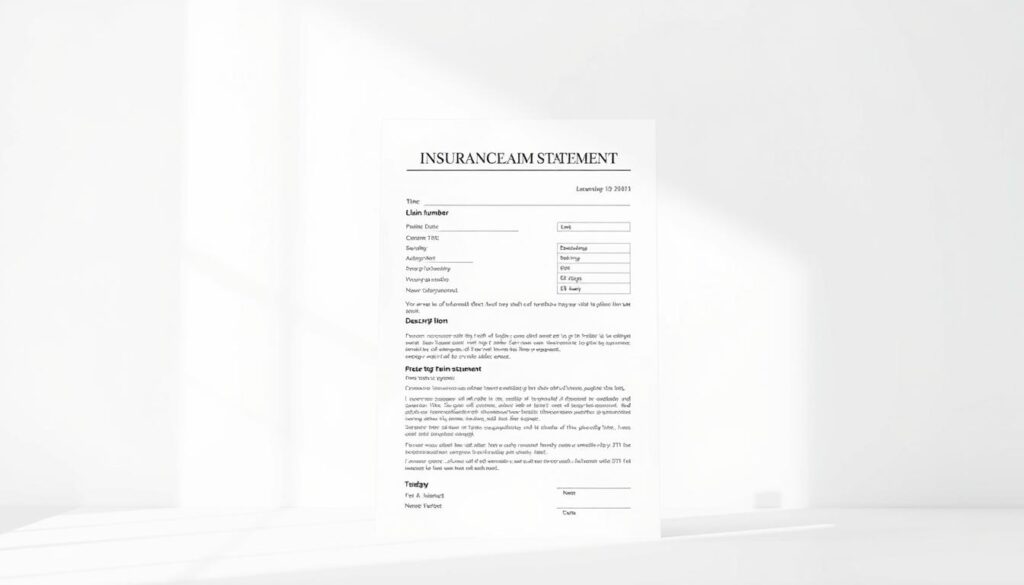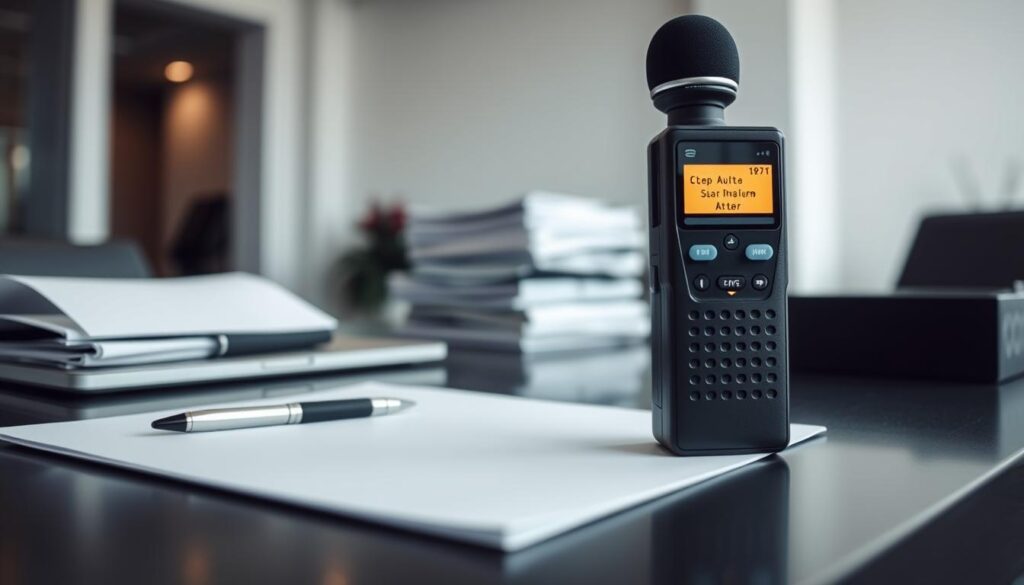After being injured in a car accident, you’ll likely need to notify your insurance provider about the crash. It’s essential to be cautious when speaking with insurance representatives, as your words can impact your claim.
While your insurance company is theoretically on your side, it’s crucial to be careful about what you say in any statement after an accident. Providing a recorded statement without proper guidance can lead to unforeseen consequences.
Understanding your rights and obligations when your insurer requests a statement is vital. I’ll guide you through the process, explaining what to say, what not to say, and when to seek legal assistance to protect your interests during the claims process.
Key Takeaways
- Understand why insurance companies request recorded statements after accidents.
- Learn the potential risks of providing a recorded statement to your insurance company.
- Know your legal rights and obligations when your insurer requests a statement.
- Get practical guidance on handling insurance requests and maintaining a cooperative relationship.
- Discover strategies for protecting your interests during the claims process.
Understanding Why Insurance Companies Request Recorded Statements
When an insurance company asks for a recorded statement, it’s crucial to know why they need it and how it affects your claim. Insurance companies want a recorded statement because it’s typically much easier and faster to get someone to describe an accident orally than it is to wait for them to submit a written statement.
The Insurance Company’s Agenda
The primary reason insurance companies request recorded statements is to expedite the claims process. By obtaining a recorded statement, they can quickly gather information about the accident, which helps them determine coverage, liability, and the value of your claim. However, providing a recorded statement can be risky, as any statement you make could potentially be used against you by the other driver’s insurer.
How Recorded Statements Fit Into the Claims Process
A recorded statement is a crucial part of the insurance company’s investigation. It allows them to establish a baseline account of the accident, which they can compare against later statements or evidence. The timing of a recorded statement request can be strategic, often occurring before you fully understand your injuries or damages. Here’s a breakdown of how recorded statements fit into the claims process:
- The insurance company requests a recorded statement to gather initial information about the accident.
- The recorded statement is used to determine coverage, liability, and the value of your claim.
- The statement is documented, stored, and potentially shared between insurance companies involved in the same claim.
- The insurance company compares your recorded statement with other evidence, such as police reports and medical records.
As John Smith, a renowned insurance expert, once said, “The recorded statement is a critical piece of evidence in the claims process. It’s essential to be cautious and prepared when providing one.” (
A recorded statement can be a crucial factor in determining the outcome of your claim.
)
| Claims Process Stage | Role of Recorded Statement |
|---|---|
| Initial Investigation | Gathering information about the accident |
| Determining Coverage and Liability | Establishing a baseline account of the accident |
| Evaluating Claim Value | Comparing the recorded statement with other evidence |

Your Legal Rights When My Own Insurance Company Wants a Recorded Statement
If your insurance company asks for a recorded statement following an accident, it’s essential to be aware of your legal rights. Most insurance policies include clauses that require policyholders to cooperate with the insurer during the claims process.
Cooperation Clauses in Your Insurance Policy
Cooperation clauses are standard in most insurance policies. These clauses mandate that you provide information to your insurer when requested. However, the extent of the information you’re required to provide can be nuanced.
Difference Between Notification and Providing a Statement
Notifying your insurance company about an accident is not the same as providing a detailed recorded statement. You can initially report the accident without divulging extensive details. For instance, you might inform them of the date, time, and location of the accident without elaborating on the circumstances.
| Notification Details | Recorded Statement Details |
|---|---|
| Date, Time, Location of Accident | Detailed Circumstances of Accident |
| Basic Information About Parties Involved | Potential Witness Statements |
| Initial Report of Accident | Detailed Account of Events |

The Risks of Providing a Recorded Statement
After being involved in an accident, you’re often required to provide a recorded statement to your insurance company, a step that demands caution. This statement can be a crucial piece of evidence in your claim, but it’s essential to understand the potential risks involved.
Word Traps and Leading Questions
Insurance companies may use leading questions or word traps to elicit information that can be used against you. These tactics can result in statements that are misleading or inaccurate, potentially damaging your claim.
Permanency of Your Statements
Once a statement is recorded, it becomes a permanent part of your claim file. Any inconsistencies or inaccuracies can be difficult to rectify later, making it crucial to ensure that your initial statement is accurate and thorough.
How Inconsistencies Can Damage Your Claim
Inconsistencies between your recorded statement and other evidence, such as police reports or medical records, can be used to undermine your credibility and potentially reduce or deny your claim. It’s vital to be aware of these risks and take steps to minimize them.
- Insurance companies meticulously compare your recorded statement with other accounts of the accident.
- Minor inconsistencies can be used to question your credibility.
- Normal memory variations after a traumatic event can be mischaracterized as dishonesty.
- Inconsistencies between your description of injuries and subsequent medical diagnoses can impact your claim.

What You Should Say in a Statement to Your Insurer
When giving a statement to your insurance company, it’s essential to stick to the facts. Your insurer may request a recorded statement after an accident or injury, and being prepared is crucial.
Sticking to the Basic Facts
It’s vital to provide accurate and concise information when describing the accident or injury. Avoid speculating or guessing about details you’re not sure of. If you don’t know the answer to a question, it’s perfectly fine to say so.
Appropriate Responses to Common Questions
Here are some examples of how to respond to common questions from insurance adjusters:
| Question Type | Example Response |
|---|---|
| Accident Details | “I’m not sure about the exact details, but I can tell you what happened from my perspective.” |
| Injuries | “I’ve been experiencing [symptoms], and I’m seeking medical attention.” |
| Pre-existing Conditions | “I have a pre-existing condition, but I’m not sure how it relates to the current claim.” |
When discussing your injuries or damages, be cautious not to minimize or exaggerate their impact. Stick to the facts and avoid making medical conclusions.

By being prepared and knowing how to respond to your insurer’s questions, you can protect your interests and ensure a smoother claims process.
What You Should NEVER Say to Your Insurance Company
It’s essential to understand that certain statements can jeopardize your insurance claim. When communicating with your insurer, being cautious with your words is vital to protect your interests and ensure a smooth claims process.
Avoiding Admissions of Fault
Never admit fault or apologize for the accident when speaking with your insurance company. Such statements can be used against you to deny or minimize your claim. Instead, stick to the facts and let the investigation determine the cause.
Don’t Speculate About What Happened
Speculating about the accident can lead to inconsistencies in your statement, potentially damaging your credibility. It’s best to say you don’t know or are unsure rather than making unsubstantiated claims.
Never Downplay Your Injuries
Downplaying your injuries or saying you weren’t hurt can complicate your claim. Many serious injuries, such as whiplash or soft tissue damage, may not be immediately apparent. Be honest about your symptoms without exaggeration, and avoid making medical conclusions about your condition. Insurance companies track your descriptions across communications to identify inconsistencies, which can affect your compensation.
To protect your right to compensation, it’s crucial to be precise when describing your symptoms and to avoid contradicting later medical records. When discussing your injury or the extent of your personal injury, focus on the facts and let your medical records speak for themselves.
How to Politely Decline Giving a Recorded Statement
A request for a recorded statement from your insurer doesn’t have to be intimidating if you know how to react. When an insurance adjuster asks for a recorded statement, it’s vital to respond in a manner that is both clear and courteous.
One effective way to decline is by offering written alternatives. This approach allows you to maintain control over the information you provide.
Offering Written Alternatives
You can say, “Thank you for your request, but I do not believe it is in my best interest to provide a recorded statement at this time. I’d be happy to supply any relevant documentation or information in writing.” This shifts the conversation toward written communication, where you have more control over your words.
Sample Scripts for Refusing Respectfully
Here are a few examples of how to decline a recorded statement politely:
- “I’m not comfortable providing a recorded statement. Can I provide the necessary information in writing instead?”
- “I’d prefer to submit my statement in writing to ensure accuracy.”
By using such scripts, you can maintain a professional tone while protecting your legal interests. It’s also essential to document your interactions with insurance representatives, including keeping notes about who you spoke with and what was discussed.

When to Consult with a Car Accident Attorney
Knowing when to seek the expertise of a car accident attorney can significantly impact the outcome of your case. If you’re dealing with a complex insurance claim or facing challenges in getting fair compensation, it’s time to consider consulting a professional.

How an Attorney Can Protect Your Rights
A car accident lawyer can protect your rights and help you seek the compensation you need. They understand the intricacies of personal injury law and can navigate the legal system on your behalf. With their experience, they can help you avoid common pitfalls that might reduce your claim’s value.
What to Expect When Working with a Lawyer
When you work with a car accident attorney, you can expect a thorough evaluation of your case, including gathering evidence and assessing damages. They will handle communication with insurance companies, ensuring that your rights are protected throughout the process. Your attorney will also keep you informed about the progress of your case, providing guidance on the best course of action.
Conclusion: Protecting Your Interests While Cooperating with Your Insurer
Protecting your interests while cooperating with your insurer is key to ensuring a fair outcome in your insurance claim. To achieve this balance, it’s essential to understand your policy obligations and legal rights. When your insurance company requests a recorded statement, be cautious and consider alternatives, such as providing a written statement. Be aware that insurance companies may prioritize their financial interests over your full compensation. If you’ve suffered a personal injury, seeking professional legal guidance can help navigate complex insurance matters and ensure you receive fair treatment. By making informed decisions, you can prioritize your recovery and financial security.
FAQ
Why do insurance adjusters request a recorded statement after a car accident?
The primary reason is to gather information that can help them determine fault and assess the extent of injuries or damages, which can impact the settlement or compensation you receive.
Can I refuse to give a recorded statement to my insurer?
Yes, you can politely decline, but be aware that your insurance policy may have a cooperation clause that requires you to cooperate with the insurer during the claims process.
What are the risks of providing a recorded statement?
The risks include unintentionally admitting fault, providing inconsistent statements, or downplaying the extent of your injuries, which can be used against you to reduce or deny your claim.
How can I protect my rights when dealing with an insurance adjuster?
It’s essential to be cautious and consider consulting with a car accident lawyer or personal injury attorney who can guide you through the process and ensure your rights are protected.
What should I say when giving a statement to my insurer?
Stick to the basic facts of the accident, avoid speculating, and don’t downplay your injuries. Be cautious with your words, as they can be used as evidence.
Can I provide a written statement instead of a recorded statement?
Yes, offering a written statement can be a good alternative, as it allows you to carefully consider your words and provide a more accurate account of the accident.
How can a lawyer help me with my insurance claim?
A lawyer can help protect your rights, ensure you’re not taken advantage of, and work to secure the compensation you deserve for your injuries and damages.
What should I expect when working with a car accident attorney?
You can expect your attorney to guide you through the claims process, help you navigate communication with your insurer, and advocate on your behalf to achieve a fair settlement.





